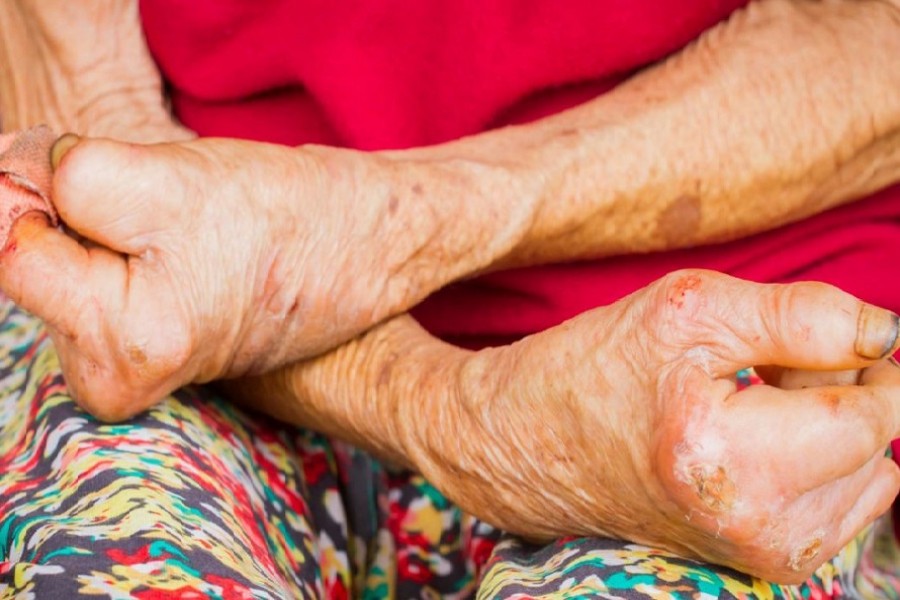Around 76 per cent of people affected by leprosy (PAL) in Bangladesh are facing a severe financial crisis during the Covid-19 pandemic, according to a study by The Leprosy Mission International Bangladesh (TLMIB).
The finding was disclosed at a workshop on "Leprosy Research Dissemination" in Dhaka Sunday, jointly arranged by National Leprosy Program (NLP) and TLMIB.
The study titled "An assessment of Covid-19 impact on persons affected by leprosy in Bangladesh", conducted by TLMIB, was funded by the Norwegian Agency for Exchange Cooperation (Norec).
Professor Dr Md Shamiul Islam, director of micro bacterial disease control (MBDC) at the Directorate General of Health Services(DGHS), presided over the meeting.
Dr Md Enamul Haque, deputy director of MBDC and manager of NLP, attended it as the chief guest, reports UNB.
A research team under the leadership of Jiptha Boiragee, programme support coordinator of TLMIB, conducted the research during March-August this year.
The research findings presented by Roton Malo, project officer of TLMIB, shows that 26% of leprosy-affected persons had no source of income during the pandemic.
Meanwhile, 47.85 per cent of PAL had no income source for 1 to 10 months during the pandemic. Only 26.27 per cent of PAL had a regular working opportunity for survival.
Also, 46.61 per cent of families of persons affected by leprosy faced food shortage during the pandemic while eight out of 255 respondents (51 per cent men and 49 per cent women) said they married off their under-aged girls to cut family expenses.
The study conducted in 17 districts from all eight divisions also reveals that 89.8 per cent of people affected by leprosy could not go to hospitals for needed leprosy-related services due to movement restrictions.
Also, 35.62 per cent of PAL with leprosy-related ulcer stayed home without services during the pandemic; 23.62 per cent PAL received ulcer care at government hospitals, Roton said while presenting the findings.
In addition, until July 2021, no leprosy patient in Bangladesh was vaccinated while 43 per cent of PAL disagreed to be vaccinated and 42 per cent of family members of PAL said their PAL member "does not need to be vaccinated."
Discussants at the research dissemination event emphasised mass awareness programmes by NLP, partnering organisations to motivate PAL and their family members to get vaccinated to be safe from Covid infections.
Also, the study found 27 per cent of persons affected by leprosy having major depression while 5.0 per cent were living with minor depression and the well-being status of 49 per cent PAL started to reduce.
The TLMIB research team used theWHO-5 Well-being Indexto examine the mental health status of PAL.
At the event, Dr Samiul Islam directed the programme manager of NLP and other officials to take necessary steps to ensure smooth services for people affected by leprosy in Bangladesh.
Researchers of TLMIB also disclosed findings of two more medical research titled "Effectiveness of single-dose rifampicin after BCG vaccination to prevent leprosy in close contacts of patients with newly diagnosed leprosy: A cluster randomised controlled trial," and "Patients with skin smear positive leprosy in Bangladesh are the main risk factor for leprosy development: 21-year follow-up in the household contact study (COCOA)."
Dr Abu Sufian Chowdhury, research coordinator of TLMIB, and Md Khorshed Alam, project manager of TLMIB, presented the findings of two medical studies.
Salomon Sumon Halder, country director of TLMIB; Dr Md Shafiqul Islam, former deputy director MBDC and programme manager of NLP; Dr Safir Uddin Ahmed, Dr Sheikh Abdul Hadi, ex-DPM, Leprosy; Dr Nayma Haque, DPM and coordinator, Leprosy; Dr Sabera Sultana, national professional officer, NTD at the World Health Organization; Dr Adnan Rassel, DPM, training and logistics; Dr Md Sohel Rana, assistant director, leprosy; Dr Shahed Hossain, consultant scientist of the (International Centre for Diarrhoeal Disease Research, Bangladesh(icddrb) were also present at the event.


